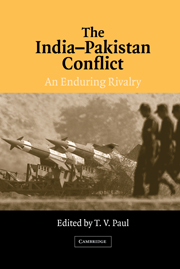Book contents
- Frontmatter
- Contents
- List of figures and tables
- Notes on contributors
- Acknowledgments
- Map: Jammu and Kashmir
- Part I Introduction
- Part II Theories of enduring rivalry and the South Asian conflict
- Part III Roots of the India–Pakistan conflict
- 6 Major powers and the persistence of the India–Pakistan conflict
- 7 Nuclear weapons and the prolongation of the India–Pakistan rivalry
- 8 National identities and the India–Pakistan conflict
- 9 At the heart of the conflict: irredentism and Kashmir
- 10 Institutional causes of the India–Pakistan rivalry
- Part IV Conclusion
- Index
6 - Major powers and the persistence of the India–Pakistan conflict
Published online by Cambridge University Press: 30 November 2009
- Frontmatter
- Contents
- List of figures and tables
- Notes on contributors
- Acknowledgments
- Map: Jammu and Kashmir
- Part I Introduction
- Part II Theories of enduring rivalry and the South Asian conflict
- Part III Roots of the India–Pakistan conflict
- 6 Major powers and the persistence of the India–Pakistan conflict
- 7 Nuclear weapons and the prolongation of the India–Pakistan rivalry
- 8 National identities and the India–Pakistan conflict
- 9 At the heart of the conflict: irredentism and Kashmir
- 10 Institutional causes of the India–Pakistan rivalry
- Part IV Conclusion
- Index
Summary
Introduction
The India–Pakistan rivalry remains both a protracted conflict and an enduring rivalry as discussed in many chapters of this volume. This chapter argues that the great powers' involvement in the India–Pakistan rivalry has helped to prolong and institutionalize the conflict; it intensified the polarization rather than help to moderate and negotiate an end to the rivalry. This chapter takes a challenging look at the role of the great powers in institutionalizing South Asia's enduring rivalry. The discussion is based on the historical record rather than abstract theorizing about India and Pakistan and regional conflict. The main claim, that until recently, and especially during the period of Nehru and the Nehruvians, the outside powers (Pakistan, UK, US, China in particular) were primarily interested in reducing India's power and influence and in building up Pakistan as the challenger to India, will be contested by Western readers. Subtle points will be made that the West (particularly UK–US) joined forces with Pakistan because of the perceived external threat to its security posed by India; that their military and diplomatic aid was meant to make the Indo-Pakistani competition evenhanded and that Cold War policy shaped the formation of the US–Pakistan military pact.
- Type
- Chapter
- Information
- The India-Pakistan ConflictAn Enduring Rivalry, pp. 131 - 155Publisher: Cambridge University PressPrint publication year: 2005
- 10
- Cited by



